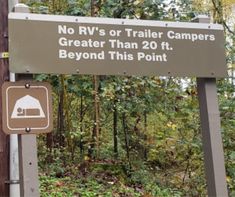NEWS
Reasons some downsize to a smaller RV:

Maneuverability: Large RVs can be more difficult to drive and park, particularly in urban areas or campgrounds with limited space. Downsizing to a smaller RV can make it easier to navigate.
Fuel efficiency: Larger RVs typically have lower gas mileage, which can be costly when traveling long distances. Switching to a smaller RV can result in better fuel economy and lower expenses.
Maintenance costs: Large RVs often require more maintenance, repairs, and upgrades than smaller ones, which can be time-consuming and expensive. Downsizing can reduce these costs.
Lifestyle changes: People's needs and preferences can change over time, and downsizing to a smaller RV may better suit their current lifestyle, such as if they are traveling alone or with a smaller group.
Financial considerations: Selling a large RV can provide a significant amount of money, which can be used to purchase a smaller RV outright or finance a smaller RV with a lower monthly payment.
Storage: Large RVs require a lot of space for storage when not in use. For people who don't have access to a large garage or storage facility, downsizing to a smaller RV can be a practical solution.
Insurance costs: Insuring a large RV can be more expensive than insuring a smaller one due to the higher value of the vehicle and the potential for greater liability. Downsizing to a smaller RV can result in lower insurance costs.
Campground limitations: Some campgrounds have restrictions on the size of RVs they allow, particularly those in national parks or other scenic areas. Downsizing to a smaller RV can make it easier to find suitable camping spots.
Travel style: People who prefer to travel more spontaneously or who enjoy boondocking (camping in remote areas without hookups) may find that a smaller RV is more suitable for their needs.
Maintenance convenience: Smaller RVs are generally easier and less expensive to maintain, as they have fewer systems and components to upkeep.
Many people may not have a garage or storage facility that is large enough to accommodate a large RV, or they may have local zoning regulations that prohibit storing a large RV on their property.
If someone is unable to store their RV at home, they may need to pay for off-site storage, which can be expensive and inconvenient. In such cases, downsizing to a smaller RV that can be stored at home can save money and provide greater convenience.
In addition, some people may not want to deal with the hassle of having to store their RV off-site, which can involve extra time and effort when preparing for trips or returning from them. A smaller RV that can be stored at home may be more appealing for those who want to minimize the logistics of RV ownership.
Again, these are just some possible reasons, and individual circumstances and preferences can vary greatly. Ultimately, the decision to trade in an RV, and the size of the new RV, depends on a variety of factors and is a personal choice.
Happy Camping!
DLM-Distribution / Campervans is a licensed manufacture and dealer located in Lake Crystal Minnesota serving clients around the country
Contact Dave: 651-285-7089 or Candy: 507-382-9446 today!
